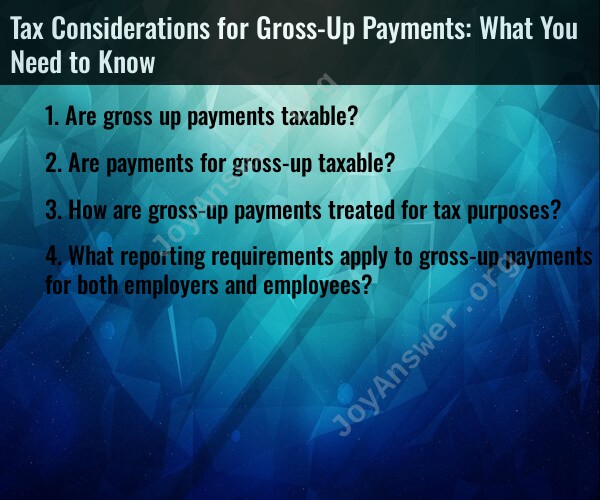Are gross up payments taxable?
Gross-up payments can be taxable, but it depends on the specific circumstances and the nature of the payment. A gross-up payment is typically made by an employer to cover taxes owed on certain types of income, such as bonuses or relocation benefits.
Here are some key considerations regarding the taxability of gross-up payments:
Type of Payment: The tax treatment of a gross-up payment depends on the type of income it represents. For example, if the payment is to cover taxes on a cash bonus, the gross-up amount itself is usually taxable as additional income to the recipient.
Tax Withholding: Employers may withhold taxes from gross-up payments, just as they would for regular income. However, the gross-up amount itself may not fully cover the recipient's tax liability, especially if the payment is subject to higher tax rates.
Tax Reporting: Gross-up payments are typically reported on the recipient's Form W-2 or 1099, depending on whether the recipient is an employee or an independent contractor. This reporting ensures that the recipient and the taxing authorities are aware of the additional income and any associated taxes.
Taxability of Benefits: Gross-up payments to cover relocation expenses or other benefits may have specific tax rules associated with them. While some relocation expenses may be tax-deductible or excluded from taxation under certain conditions, others may be fully taxable.
Consultation: It's essential for recipients of gross-up payments to consult with a tax professional to understand the tax implications fully. Tax laws and regulations can be complex and may vary depending on the individual's specific situation, jurisdiction, and the type of payment involved.
In summary, while gross-up payments are intended to cover taxes, they themselves may be subject to taxation, and the tax treatment can vary depending on the nature of the payment and other factors. Therefore, it's crucial for both employers and recipients to consider the tax implications carefully and seek professional advice if needed.
Are payments for gross-up taxable?
Yes, gross-up payments themselves are taxable.
This is because they are considered additional income for the employee. When you receive a gross-up payment, your employer essentially increases the total amount to cover the taxes they will withhold. This additional amount is added to your taxable income and is subject to income taxes and other payroll deductions.
How are gross-up payments treated for tax purposes?
Gross-up payments are reported as part of your wages on your W-2 form.
This means they are included in your total income for the year and are taxed accordingly.
What reporting requirements apply to gross-up payments for both employers and employees?
Employers:
- Employers must report the grossed-up amount and the amount of tax withheld on the employee's W-2 form.
- They also need to file their own tax forms and pay any employer-side payroll taxes on the total grossed-up amount.
Employees:
- Employees don't need to take any specific action for gross-up payments as they are reported by their employer on the W-2.
- However, they should be aware that the gross-up payment itself is taxable and will be reflected in their total taxable income.
Overall, gross-up payments can be a helpful tool to ensure employees receive their desired net pay after taxes. However, it's important to understand that the grossed-up amount is taxable for both the employer and the employee.












